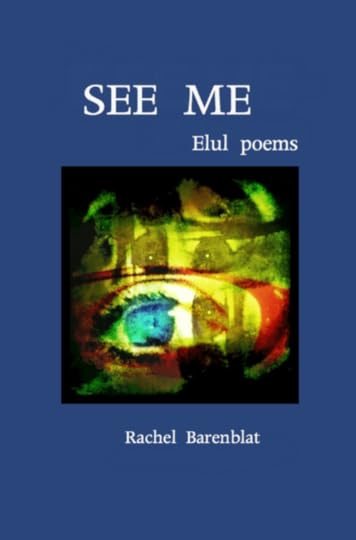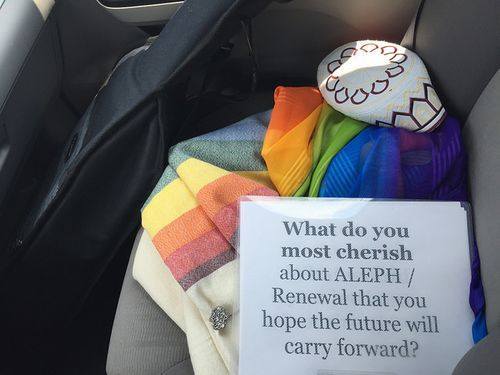Rachel Barenblat's Blog, page 122
July 10, 2015
Feminism then and now
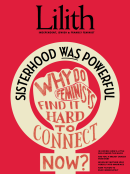 Someday I'll have time to write for Lilith magazine again. (Somehow between my congregation, our five year old, and ALEPH, I don't seem to pitch many articles to editors these days. Go figure.) But I'm honored to be quoted in the cover story for Lilith's Summer 2015 issue, Erica Brody's Confronting Generational Tensions to Build Our Badass Jewish Feminist Future.
Someday I'll have time to write for Lilith magazine again. (Somehow between my congregation, our five year old, and ALEPH, I don't seem to pitch many articles to editors these days. Go figure.) But I'm honored to be quoted in the cover story for Lilith's Summer 2015 issue, Erica Brody's Confronting Generational Tensions to Build Our Badass Jewish Feminist Future.
Here's a taste:
Last year, I was invited to an Upper West Side seder in New York with several Jewish women who had, literally, stood shoulder to shoulder four decades ago and marched into the American fray for women’s rights, creating a distinctly American, Jewish, feminist space. Included in an effort to share this experience and space with younger women, I was humming a tune of gratitude — “Well done, Sister Second Wave!” — when I kicked off my boots and lined them up next to my heroines’ in the hallway.
It’s strange being a Generation Xer (ages 35–50 in 2015, if you go by Pew Research Center metrics), no longer the young guard, not yet the old guard, a small generation bookended by two mega ones: Baby Boomers and Millennials. I’d claimed the mantle of feminism as a 14-year-old purple-haired activist spewing Emma Goldman quotes, but it was only in my late 20s that I started thinking of myself as part of a long line of Jewish feminists, proud of their achievements, steeped in the criticisms, turning tides.
Ever since, from my perch — mainly behind a screen, as a writer, editor and strategist — I’d done my best to lift up progressive Jewish women’s voices, to build bridges. Yet for a long time, to be honest, I’d blocked out the white noise of tensions between generations of Jewish feminists. I tried extra hard when I was peppered with questions from some older feminists along the lines of Why aren’t you….? No one your age seems to care about….
My voice is one of 22 quoted in the article; we range in age from 18 to 76. It's an awesome piece -- go forth and read it online, and if you're moved by what you read, consider subscribing to the magazine or buying the current issue.

July 9, 2015
Your voice knocks
When I wake
your name is honey
on my lips.
All day long
you're with me.
My heart rests
in your hand.
I am safe
in your embrace.
You know
my innermost parts.
Nothing I say
nothing I am
could drive you
away from me.
Your voice knocks.
Like a magnolia
I open.
This poem arose in me on my way home from West Chester, PA, where I spent the last several days doing ALEPH things -- first the "Getting It... Together" weekend, then an ALEPH board meeting, then getting a tiny taste of Ruach ha-Aretz and doing a bit of listening tour work before returning home.
The final stanza is the one which came to me first -- probably because I had been listening to Nava Tehila's beautiful album Libi Er (Waking Heart). The title track includes the phrase קוֹל דּוֹדִי דוֹפֵק -- "the voice of my beloved is knocking." (It's a quote from Song of Songs chapter 5.)
"You know / my inmost parts" hints at Psalm 139.

July 6, 2015
Seven more gifts from "Getting It... Together"
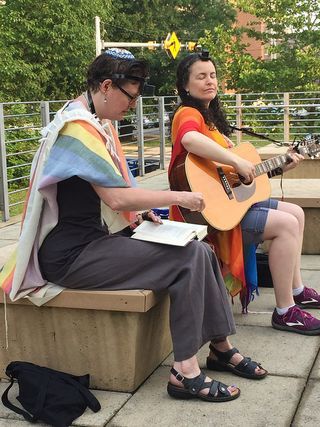
Leading Sunday morning prayer with a dear friend. (Gift #5.)
1.
One of the blessings of my Shabbat morning was davening with Hazzan George Mordecai. He has a beautiful voice, of course. Also a beautiful presence. And he frequently brings melodies I've never heard before. Sometimes this is because his knowledge is so wide and deep; his heritage is Iraqi, Turkish, and Indian, and he taps deep into Jewish melodic traditions which I don't know well.
And other times it's because he's written the melodies himself -- as with the setting of "Hallelu avdei Adonai," which I was blessed to hear him lead in March, and which he brought again this weekend. But even when he's leading melodies no one in the room knows, somehow he gets us all singing along within minutes. And oh, how his "Hallelu avdei Adonai" goes right to my heart and fills me with joy.
2.
I spent our menucha (rest) time on Shabbat afternoon sitting on the floor of a college dorm room with a guitar and a pair of prayerbooks and two friends, planning melodies for afternoon services and for morning services to follow. It was like a sweet little glimpse back into rabbinic school! And then I got to attend the Shabbat mincha services led by those two dear friends, and sing with them, and beam.
Rabbi Yitz Greenberg spoke about mincha as the hour of redemption and the time of greatest sweetness. And he spoke about living in a time when God is hidden, and how paradoxically that means that God is all the more present with us. God's transcendence may have withdrawn; we no longer live in an era of overt miracles. But we live in a time when Shekhinah, divine Presence, is everywhere.
3.
At se'udah shlishit, the "third meal" of Shabbat, my beloved friend and teacher Rabbi Elliot Ginsburg offered a vort, a word of teaching. He spoke about the powerful blend of fulfillment and yearning which characterizes that hour of Shabbat -- especially when we are together in community like this. We have moved so deeply into this "foretaste of the world to come," and we know it is about to wane.
One piece of his teaching which made me swoon was the image that when this community comes together for Shabbat in this way, together we are like a Tibetan singing bowl. We become a musical instrument together, an instrument of song and praise. Our hearts and souls resonate in harmony. He said that and I thought: yes. Yes. We are. And even after we go home, the music still reverberates.
4.
Saturday after dinner, I sat on the floor in a packed room and listened to Rodger Kamenetz speak about dream work -- not only what's in his book The History of Last Night's Dream, but also the way he's working with (and his students are working with) dreams now. He spoke about life lived on the horizontal plane and how dreams can operate on the vertical plane, taking us deep -- or lifting us high.
And then someone in the room volunteered to share a dream, within the safe space of our coming-together, and Rodger worked with that person and with the dream. And even though I wasn't the person whose dream was being explored, I came away with deeper insights into my own dreams.
5.
One of the sweet surprises of my weekend was that I got to lead Sunday morning davenen (prayer)! My friend Rabbi Aura Ahuvia led with me. The building in which we were supposed to meet turned out to be locked, but that wound up being a blessing; instead we sat in a rough circle outdoors on a patio instead, and davened along with birdsong and crickets. It is delicious to daven in the open air.
We began the morning with some gentle and melancholy melodies. Saturday was 17 Tammuz, when we remember the first breach in the walls of Jerusalem so long ago, but because it fell on Shabbat, this year that remembrance took place on Sunday. We sang the last line of Psalm 150 to "By the Waters of Babylon" and as our voices interwove I thought of the broken walls, the broken places, in our hearts.
And by the end of our davenen we had shifted mood. I said a few words about how I've come to think that the way to deal with the brokenness in the world and in our lives is to seek to find God's presence in the experience of what's broken. (As that great sage Leonard Cohen wrote, "There is a crack in everything -- that's how the light gets in.") We closed with sweet and heartfelt song.
I love leading davenen for a room (or, in this case, a patio) full of people who are dear to me and to whom the words of the prayers mean as much as they do to me.
6.
At the Sunday "Living the Legacy" event which served as the culmination for the weekend, we heard from several of those who were on that historic trip to Dharamsala, and from other luminaries as well. Of course, Rodger spoke beautifully. I was so immersed in listening that I failed to take a single note! And he showed a video clip from Dharamsala, including a few moments which weren't in the film.
Rabbi Moshe Waldoks pointed out that adopting techniques -- acculturating, not assimilating -- has always been part of our tradition. We can take the best of what's outside to help us strengthen inside. Rabbi Yitz Greenberg said that this moment in time is either an age of tikkun olam (repairing the world) or chorban olam (destroying the world) -- and the choice is up to us.
Alaa Murad said that we can cherish our differences, even feel pride in those differences, and still be able to learn with and value each other. My friend and teacher Rabbi Shaya Isenberg, who moderated the discussion (and who taught the first ALEPH class I ever took, which was on deep ecumenism) spoke about dialogue and spirituality, saying, "I can learn from you without becoming you."
Rabbi Leah Novick taught that we don't need to lose our specificity when we come together. She said, "Learning from other traditions has made me a better Jew and a better rabbi." Dr. Rachael Wooten urged us, "Know your teachings deeply enough to use them in service of what you believe in." She said, "go deeper into what you already do." She said, "The real work is inner work."
7.
Right on the heels of "Getting It... Together," we began a two-day ALEPH Board meeting. The first thing we did, upon gathering around the table, was sing a blessing for the dinner we had just eaten. Then Rabbi Shohama Wiener, who acts as Rosh Hashpa'ah (head of spiritual direction) for our Board, offered an opening blessing and niggun and we sang more. Oh, impromptu ten-part harmonies!
And then we went around the table and spoke a few words about how each of us is. The dear friend who was sitting beside me said that being here with our hevre -- the singing, the davenen, the love of Torah, the companionship -- fills her up. When it was my turn, I said, "I feel exactly the same way." What a gift it is to be able to serve, as co-chair, this community of which I am so blessed to be a part.

See me: poems for Elul
In fall of 2014 I participated again in #blogElul, posting each day on themes relating to teshuvah (repentance / return) and inner growth during the month leading up to the Days of Awe. Last year, for the first time, I wrote poems in response to each of the 29 prompts.
As a working rabbi, I tend to find Elul pretty busy. But these poems poured out of me. Writing them gave me a touchstone, a sustaining thread of spiritual practice, which helped me connect with my own inner work even as I was preparing for the High Holidays in a practical way.
After the month was over I took some time to let the poems rest, and then returned to them with an eye to revising and improving them. I shared them with some trusted readers. And now I am delighted to be able to share them once again with you -- now in printed and bound form, and also as an e-book.
See me: Elul poems
The lunar month of Elul (leading up to the Days of Awe / Jewish high holidays) is a time for self-examination, contemplation, and the inner work of teshuvah, repentance or return. Here are 29 poems, one for each day of Elul, which aim to open the reader up to awe, reflection, and the spiritual experience of being truly seen.
Print edition: $10 on Amazon | £6.25 on Amazon.co.uk | €7.98 on Amazon Europe
E-book edition: $6 on Amazon | £4.07 on Amazon.co.uk | €5.72 on Amazon Europe
(And if you buy the print edition, you can add the digital edition for 99 cents.)
If you are at ALEPH's Ruach Ha'Aretz summer retreat this week, you can buy this book at the shuk! Copies of my collection of Torah poems, 70 faces (Phoenicia, 2011) are also available at the Ruach shuk.
Elul doesn't begin until mid-August, but I wanted to share word of this collection now. Feel free to buy it for yourself, or for a friend, as an early Elul present! I'll post about it again as that lunar month approaches. (And if you lose track of this post, you can always find See Me: Elul Poems listed on the chapbooks page of my website.)

July 4, 2015
The first five gifts from Getting It... Together
The first gift of the "Getting It... Together" weekend came when I arrived in time to sit in on the last hour of a morning class. The week leading up to this celebratory weekend was "smicha students' week." The ALEPH ordination programs students, faculty, and some musmachim (alumni), have been here all week learning, praying, being together. I got to sit in on the last hour of Reb David and Reb Shohama's morning class, which meant that not only did I get to see some dear friends teach, but I also got to hear the new melody for the angel song which Shir Yaakov had written during the class. (Holy wow.)
The second gift of the weekend came during the opening program, when I got to hear our special guests -- among them Rabbi Yitz Greenberg, Blu Greenberg, Rabbi Moshe Waldoks, and Rodger Kamenetz -- offer reflections and remembrances of Reb Zalman. I particularly remember Reb Moshe making us laugh and also reminding us of Reb Zalman's profound teaching that each of us can be a rebbe -- and it's not only that we can, but that we're obligated to. And Rodger's words to Reb Zalman, spoken so sweetly, about how in Reb Zalman's voice and heart one became lebn, beloved.
We closed that program by singing again the three-part zhikr which we sang at the Remembering Reb Zalman celebration last year. The power of those melodies and words is multiplied in the experience of singing them with others to whom they have meaning. Then came the gift of evening prayer. I got to daven with two of my beloveds beside me, and others in front of me, and still others behind me -- like the angels in the angel song. What was I just saying about the power of prayer being redoubled in the experience of singing with others to whom the words of our liturgy have meaning? That.
The fourth gift came when two of the ALEPH student hazzanim led us in the full Birkat HaMazon, the grace after meals. Which we sang with all of the well-loved rigamarole, from pounding on the tables, to the silly and sweet after-joys of the niggunim which naturally follow. ("What's the fifth letter of the Hebrew alef-bet?" "HEY!" Yai, di dai, di dai, di dai dai dai di dai di dai di dai dai dai dai dai, HEY!) I rejoiced watching people who are dear to me dancing arm in arm as we sang praises. Then there were niggunim and zemirot. Shabbat melodies, sung with gusto and heart. Songs of yearning; songs of joy.
And then I retired with a few dear friends, and a bottle of wine and a bottle of fig arak and two guitars, and we sang and reminisced and sang (and sang) for another few hours. It was as though the davening had never stopped -- prayers, Hebrew songs, melodies old and new, we just kept singing. I stayed up far too late. I woke far too early. Usually I guard my sleep fiercely! But I woke with a song on my lips and in my heart, and the joy of the melody lifted me. Perhaps I have been temporarily transmuted into an angelic being who subsists not on food and sleep but on the sheer joy of togetherness and praise.

July 3, 2015
Off to West Chester!
The front seat of my car, piled with prayer gear, my guitar, and some printouts for Tuesday's stop (at Ruach ha'Aretz) on the ALEPH Listening Tour.
To those who will be joining us at Getting It... Together, I wish safe travels and look forward to seeing y'all in time for Shabbat! And in broader terms, I wish a Shabbat shalom to all who celebrate.

July 1, 2015
Feels like coming home
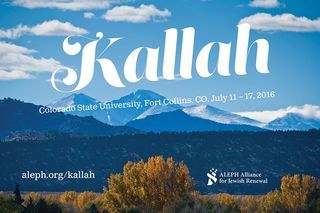 Two years ago yesterday I wrote, "Anytime I enter a place where my Jewish Renewal community has gathered, it feels like coming home."
Two years ago yesterday I wrote, "Anytime I enter a place where my Jewish Renewal community has gathered, it feels like coming home."
Have you ever heard anyone say "Welcome home to a place where you've never been?" That was how it felt for me, the first time I gathered with my Jewish Renewal hevre. Here were people who cared about Judaism, who cared about God, who blended the passionate God-focus of Hasidism with the kind of feminism and social justice underpinnings I hold dear. I struggle to describe it; ultimately it's a feeling, an experience. I have always been quirky, spiritual, different. From the moment I first set foot in a Jewish Renewal retreat setting, I could tell that I wasn't alone. I knew that I had found my spiritual tribe.
(Read the whole post, written at the start of the most recent ALEPH Kallah: Welcome home to a place where you've never been, 2013.)
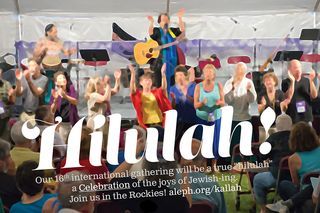 I know that when I arrive in West Chester, PA, on Friday for Getting It... Together, I will feel the same way.
I know that when I arrive in West Chester, PA, on Friday for Getting It... Together, I will feel the same way.
And it will be true again next summer when I travel to Colorado for the ALEPH Kallah. (Next summer I'm planning to bring our son with me, to the Kids' Kallah -- that will be a first, and one which I anticipate with some eagerness!)
Save the dates of July 11-17 2016 -- we're already hard at work planning next summer's Kallah, and I know it's going to be superb. And to those who are joining us this coming weekend, travel safely and I look forward to seeing you soon...

June 30, 2015
Yearning
You know that feeling you get sometimes when you hear a piece of music and it makes your heart want to leap right out of your chest? Maybe it's because of what the words mean, or because of how the melody lifts you, or because of what the song represents in your memory. It makes you want to laugh, and to weep, and to do both at the same time, because it doesn't seem possible to feel so much.
Or maybe there's a person in your life who brings out that feeling in you. You see them across a crowded room and your heart does a somersault. You just want to be near them, to say something that will make them happy, to have the right to reach over and touch their shoulder. Your very being is singing because you are together, and part of you can't help already mourning that you will part.
Maybe there's a place that awakens this in you. You see it in your dreams and when you wake you ache with the fact that you're not there. Maybe it's a real place, and maybe it's somewhere you've never seen, and maybe it's someplace that doesn't even exist yet. All you know is, something is calling you there, and you want to be there; you want to go back; you want to be there and to never have to leave.
All of that is what Shabbat can feel like, sometimes, when I'm experiencing it with other people for whom it means as much as it can mean to me. On retreat it can feel like a visit to Brigadoon, to someplace magical, out of time. A place suffused with the music that makes my heart overflow. A place where I get to be with beloveds whose presence makes my heart sing. 25 hours is never long enough.
Shabbat can feel like reuniting with someone I love. And reuniting with someone I love can feel like Shabbat, no matter on what day of the week our reunion may fall. Can you imagine counting the days until Shabbat all week as though Friday sundown were going to bring the opportunity to embrace someone you adore? Can you feel the anticipation, the way that togetherness feels like being home?
Sometimes the yearning is almost painful. The yearning to be with the beloved (with the Beloved.) The yearning to be swept away by that music. The yearning to feel that bone-deep connection. And I know that I'm fortunate to feel this kind of heartache. Because I know that even though I can't live there forever, I will be visited by the miracle of the yearning -- even if it's only temporarily -- being fulfilled.

June 29, 2015
Jew in the Lotus - on film
In preparation for Getting It... Together, the coming weekend's gathering celebrating the 25th anniversary of that historic trip taken by a group of rabbis and a poet to Dharamsala to meet with the Dalai Lama, I finally watched Laurel Chiten's film The Jew in the Lotus, which arose, of course, from Rodger Kamenetz's best-selling book of the same title. (Here's Patrick Sullivan's review of the film: Spiritual power blossoms in 'The Jew and the Lotus'.) Here's the first minute or so of the film:
The film and the book overlap in obvious ways. The filmmaker became interested in the story after reading the book, and there are moments from the book which appear in the film -- much to my delight. But in many ways the film's project is the telling of a different story, a story about personal loss and how the trip to Dharamsala marked a turning point for healing. I hadn't known that story, nor that it would be so central. It moved me deeply, though it wasn't what I was expecting to see.
For me the greatest joy was in glimpsing the footage of the dialogue in Dharamsala. Because I just reread the book, its images and scenes are alive in my memory. In rereading, I was particularly struck by a description of joyful morning prayer -- which the film offers me the chance to briefly witness. And of course there's the amazing scene where Reb Zalman z"l is talking about the angel of the Jews and the angel of Tibet, about which I wrote a few weeks ago; to my delight, that scene is in the film, too.
I wasn't blessed to meet Reb Zalman in person until he was 80, so I only knew him during the last decade of his life. But on the trip to Dharamsala he was a hale and hearty 65, and when the film was made he wasn't much older. I loved having the chance to witness him as he was then. His voice and his demeanor and the sparkle in his eye are all familiar, but this is a younger Zalman than I ever knew. It's a little bit like seeing old movies of one's parents or grandparents -- the past, once again made life.
I know that next time I reread the book I'll have some of these visuals in mind alongside Rodger's descriptions. And now I'm even more excited about the Sunday session which will serve as the culmination of the weekend -- "Tracing Reb Zalman’s Vision, from Dharamsala to the Future" -- where we'll hear from several of the trip's participants. I'm looking forward to hearing how they reflect back on that journey now, and their hopes for how its values can be carried forward in years to come.
If you won't be able to join us in West Chester but are interested in the Sunday program, go to aleph.org/together and click on the "Live-streaming and yahrzeit tributes" link. If you make a donation there, you'll receive a link to the livestream of Sunday's program.

June 28, 2015
Lean On Me: Moshe and Joshua, striking the rock, and change
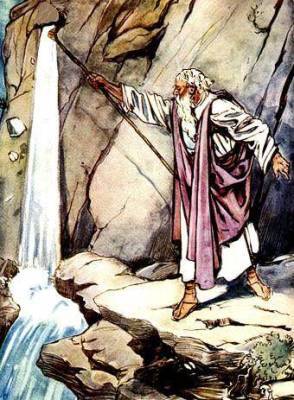 In the verses we just read, Miriam has just died and the people have no water. God tells Moshe to speak to a rock so that it will yield water for the children of Israel. Moshe, instead, responds with snark: "Listen, you rebels -- shall I get water for you out of this rock?" He hits the rock. The rock gives water, but God is not pleased. God says: Because you failed to make Me holy in the eyes of the Israelites, you will not enter the promised land.
In the verses we just read, Miriam has just died and the people have no water. God tells Moshe to speak to a rock so that it will yield water for the children of Israel. Moshe, instead, responds with snark: "Listen, you rebels -- shall I get water for you out of this rock?" He hits the rock. The rock gives water, but God is not pleased. God says: Because you failed to make Me holy in the eyes of the Israelites, you will not enter the promised land.
Those of you who were here last Shabbat afternoon heard our bat mitzvah's perspectives on this story. She opened up some classical teachings about the text, but ultimately concluded that from her point of view, this is profoundly unfair.
I can understand that. Moshe may have thought this was pretty unfair, too. First of all, when God spoke to him from the bush which burned but was not consumed and told him to go to Pharaoh, he said "who am I to do such a thing? I stammer. Send someone else." He didn't want the leadership position in the first place, but God deployed him anyway.
Then he gave his entire life to leading the people of Israel through the wilderness. The people kvetched and they quarreled and they pushed him to his breaking point. He lost his temper this one time, and for that, he's denied entry into the place they've been yearning to reach?
I have a lot of empathy for this vision of Moshe. How frustrated he must have been. How tired of feeling under-appreciated and undervalued, of deferring whatever his own dreams might have been in order to lead this difficult people. But what happens if we read today's verses not as a punishment but as a natural shift in generations?
Moshe snaps at the people and hits the rock and God thinks: ahh -- I see that you're approaching the end of your rope. So God gives notice to Moshe: you've done amazing things, and I can see that you're getting weary, and it's okay -- you've led the people so very far -- you don't have to lead them all the way. You can place your hands on Joshua and give him some of your spirit. Lean on him (that's what smicha means), transmit your Torah to him, and then let go. Trust the next chapters of your people's story to his hands and his heart.
Before the end of his story, Moshe will have the opportunity to stand before the people and remind them of everything they've experienced thus far. That's the book of D'varim / Deuteronomy -- the Hebrew name means "Words," and the Greek name means "Second telling." Moshe gets to give over his wisdom one final time before he dies, and when he dies, Torah tells us, God buries him.
When I imagine myself in Moshe's shoes at the end of his life, I imagine gratitude at the opportunity to pause before the end and retell my own story. Moshe stands before the Israelites and speaks the poem of his life, the poem of their lives, giving meaning to everything they have experienced. He has the opportunity to meet death gently, at an advanced age, after having told his story and done the inner work of letting go. We should all be so lucky.
And when I imagine myself in the shoes of Joshua, Moshe's successor, I imagine gratitude at the opportunity to spend a lifetime learning from the greatest prophet the Jewish people would ever know. I imagine Joshua feeling humbled by the awesome task of trying to take over for Moshe -- Moshe, who spoke face-to-face with God, who brought Torah down from Sinai, who presided over the Exodus from an old world to a new one. Never again will there arise a prophet like Moshe. Talk about a hard act to follow.
I hope that Joshua said thank you often enough. I hope he communicated to Moshe how honored he was to be ordained in his lineage, and how much love he felt for the people they were both called to serve, and how deeply he knew that he wouldn't be leading the people forward from there if Moshe hadn't gotten them as far as he did.
And I hope that before he died Moshe was able to reflect back on the scene we just read, and maybe to chuckle with a little bit of chagrin, and to feel gratitude that he had such a student to whom he could pass on his gifts. A student who became a colleague, in the end; a successor; maybe even a friend.
Here's the d'var Torah I offered yesterday at my shul for parashat Chukat. (Cross-posted to my From the Rabbi blog.)

Rachel Barenblat's Blog
- Rachel Barenblat's profile
- 6 followers


